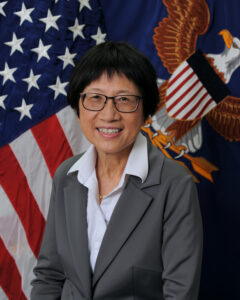The Pentagon’s new lead technology official on Tuesday detailed her top priority areas for leveraging commercial industry innovation, to include trusted artificial intelligence and quantum computing, as well as new initiatives she’s leading to make it easier for small businesses to work with the department.
Heidi Shyu, under secretary of defense for research and engineering, specifically cited the Pentagon’s new Innovation Steering Group and a push for legislation to bolster funds for the Small Business Innovation Research (SBIR) program as key efforts to bring in more innovative ideas from smaller businesses and non-traditional partners.

Shyu said the new Innovation Steering Group initiative, started by Deputy Defense Secretary Kathleen Hicks, will look to bring in industry to propose technology concepts that can help close joint warfighting capability gaps “with the goal of pushing innovation much, much quicker.”
“If you think your product can close a capability gap that we articulate, we’d like to be able to experiment with it,” Shyu said during a discussion at the virtual Fed Supernova event, noting the next Innovation Steering Group sprint is scheduled for next spring with plans to run multiple proposal sprints per year to align with joint experimentation efforts.
For SBIR, which provides grants for small businesses to work on novel technology areas, Shyu said her office is requesting legislation to give DoD the ability to fund ideas when there may not be a program office ready to take on that specific capability following the end of a program’s first phase.
“We’re proposing to have multiple [SBIR] Phase II tranches of money to continue to mature the technology and pave over the valley of death,” Shyu said.
During the discussion, Shyu laid out her priority areas where she’s looking to leverage industry’s breakthroughs, ranging from resilient networking and secure command and control systems to “ensure seamless connectivity” and new capabilities in the trusted AI and quantum computing space.
“The first time this unmanned platform does something that the user didn’t anticipate, you’re going to lose trust in this unmanned system. So I want to have the ability to have trusted AI and ML and trusted autonomy,” Shyu said. “There’s absolutely a race in the quantum computing world. There’s all kinds of innovative small companies that are being funded by venture capital firms. By my last count, there’s over a hundred different companies just within the U.S. that are focusing on quantum computing.”
On quantum computing, Shyu said she wants to get after capabilities that are scalable and noted the technology’s potential capability to help with breaking encryptions.
Shyu also said she’s interested in exploring advancements in virtual reality and augmented reality to support live training and operations.
“This technology is really maturing with the gaming industry. I want to be able to leverage the commercial technology that’s out there to enable us to have distributed operations so we can enable rapid mission planning and command and control in a low bandwidth environment. Because, guess what, in a contested environment you don’t have all the bandwidth that you would like to have. You might not have 5G [access],” Shyu said.
Additional areas of interest include directed energy, specifically high energy lasers and high-powered microwaves, and assured software tools.
“You want to be able to trust the software that you’re developing and that’s one of the very difficult issues that we’re dealing with,” Shyu said.
Shyu, who was confirmed by the Senate in July, previously served as the Army’s top acquisition official from September 2012 to January 2016.